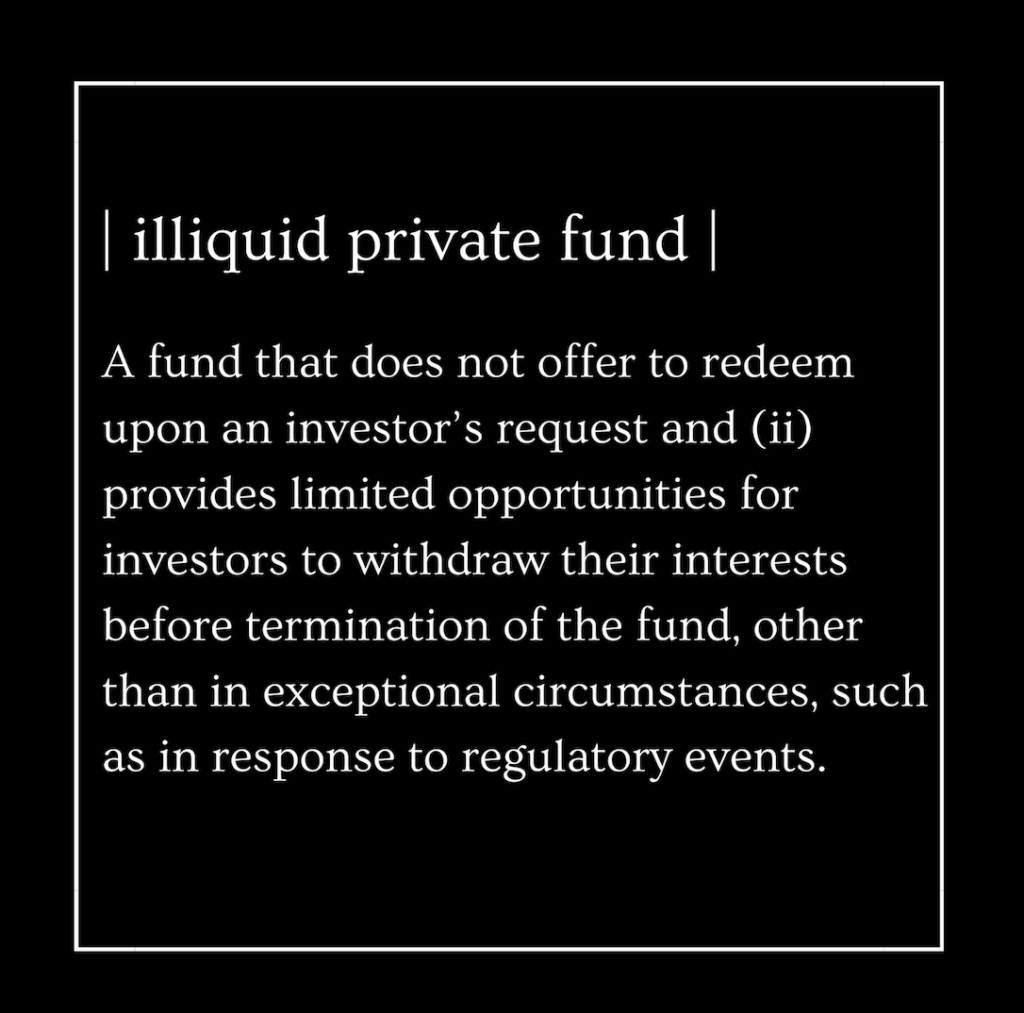Final rule 211(h)(2)-3 (the “Preferential Treatment Rule”) can be broken down into two distinct components – prohibited preferential treatment and disclosable preferential treatment. The final rule prohibits advisers from providing certain preferential treatment that the adviser reasonably expects to have a material negative effect on other investors and requires advisers to disclose any other preferential treatment to both prospective and current investors.
Prohibited Preferential Treatment
The headline grabber in the prohibited preferential treatment component of the Preferential Treatment Rule is the prohibition on preferential redemption rights and preferential information rights. The final rule release devotes significant text to the discussion of the “prohibition on certain preferential redemption rights” (with two exceptions) and the prohibition on “preferential information rights about portfolio holdings or exposures” except where the adviser offers such information rights to all investors.
However, redemption and information rights are not the only preferential treatment prohibited under the Preferential Treatment Rule. The less reported aspect of the prohibited preferential treatment component is the other types of preferential treatment may be prohibited. The SEC makes it clear that any preferential treatment that an adviser “reasonably expects” to have a “material, negative effect on other fund investors or investors in a similar pool of assets” is prohibited. The SEC goes on to say the prohibition applies to preferential treatment provided through “various means, including written side letters.” Whether an adviser could have reasonably expected certain preferential treatment to have a material, negative effect will be judged on the facts and circumstances at the time the adviser grants the preferential treatment.
Prohibited Preferential Redemption Rights
The SEC adopted the prohibition on certain preferential redemption terms with two exceptions. An adviser is not prohibited from offering preferential redemption rights if the investor is required to redeem due to applicable laws, regulations or orders of any relevant foreign or U.S. Government, State, or local subdivision to which the investor, private fund, or similar pool of assets is subject. Advisers that use this exception are still subject to the disclosure obligations in rule 211(h)(2). Additionally, an adviser is not prohibited from offering preferential redemption rights if the adviser has offered the same redemption ability to all other investors and will continue to offer such redemption ability to all future investors in the same private fund or any similar pool of assets.
Prohibited Preferential Transparency
In the rule release the SEC provides a number of examples where it believes preferential transparency rights act to disadvantage investors who do not benefit from such transparency. However, in a shred of good news for illiquid fund advisers, the SEC notes a key factor in evaluating whether preferential information rights have a material, negative effect (and therefore are prohibited) is an investor’s ability to redeem their interest in a fund. The SEC goes on to say they “would not generally view preferential information rights provided to one or more investors in an illiquid private fund, as having a material, negative effect on other investors” but stopped short of providing a blanket exemption for all closed-end funds.

The SEC provides one exception to the prohibition on preferential transparency. An adviser is not prohibited from providing preferential information if the adviser offers such information to all existing investors in the private fund and any similar pool of assets at the time of substantially the same time.
Legacy Provision
The SEC is providing legacy status under the prohibitions aspect of the Preferential Treatment Rule. The legacy status provisions apply to governing agreements that are entered into prior to the compliance date if the rule would require the parties to amend such an agreement. To prevent advisers from abusing this provision, legacy status applies only to such agreements with respect to private funds that had commenced operations as of the compliance date. The commencement of operations includes any bona fide activity directed towards operating a private fund, including investment, fundraising, or operational activity. Examples of activity that could indicate a private fund has commenced operations include issuing capital calls, setting up a subscription facility for the fund, holding an initial fund closing and conducting due diligence on potential fund investments, or making an investment on behalf of the fund.
Disclosable Preferential Treatment
In the final rule release, the SEC acknowledges advisers provide a range of preferential treatment to investors. In the case of preferential treatment that does not have a “material, negative effect on other fund investors” the SEC believes disclosure “effectively addresses” their concerns because transparency will provide investors with helpful information. Accordingly, the final rule has a tiered disclosure requirement based on the preferential treatment provided.
Pre-Commitment Disclosure
For preferential treatment provided to other investors in the same private fund, advisers must provide advance written notice to prospective investors of any “material economic terms” granted to other investors.
“Material economic terms” was not defined. However, it is clear from the SEC’s description that these are terms that a prospective investor would find most important and that would significantly impact its bargaining position. The SEC gave the following examples:
- Cost of investing
- Liquidity rights
- Fee breaks
- Co-investment rights
- GP stakes investment
Post-Commitment Disclosure
For all other preferential treatment provided by advisers that does not involve “material economic terms” an adviser to an illiquid private fund must distribute a notice to all current investors “as soon as reasonably practicable” following the end of the fund’s fundraising period.
Annual Disclosure
The final rule requires advisers to provide current investors, on at least an annual basis, with a comprehensive disclosure of all preferential treatment the adviser has provided since the last notice. However, a closed-end fund that does not admit any new investors or provide new terms to existing investors following the end of its fundraising period would not need to deliver an annual notice unless new disclosure obligations arose as the rest of an investor transfer.
Recordkeeping
The SEC is amending rule 204-2 (the “Recordkeeping Rule”) alongside the adoption of the Preferential Treatment Rule. As amended, the Recordkeeping Rule will require advisers to make and retain copies of all written notices sent to current and prospective investors. Additionally, the SEC is requiring advisers to retain copies of a record of each addressee and the corresponding dates sent to facilitate the SEC’s Division of Examinations’ staff’s ability to assess an adviser’s compliance with the Preferential Treatment Rule.

